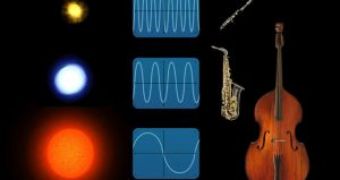We all know that light is much faster than sound: we first see the lightening, and after that we hear the thunder.
That's because the maximum speed for sound is imagined about 5000 m/s, while for light is 299,792,458 m (186,000 miles)/s.
But now a research team has transmitted sound pulses faster than light.
Do not expect to ever see sound-propelled spaceships faster than light, but the research could still enhance the speed of electrical and other signals higher than before.
Einstein's theory of relativity says that matter and signals cannot travel faster than c, the speed of light in air (186,000 miles/s).
But a team at Middle Tennessee State University in Murfreesboro managed to transmit sound waves faster than c using little more than a plastic plumbing pipe and a computer's sound card.
"This experiment is truly basement science," said physicist William Robertson.
Every pulse of sound or light is a group of intermingled waves, and the pulse rises and falls with energy over space, with a peak of strength in the middle.
The team transmitted sound pulses from the sound card through a loop made from PVC plumbing pipe and connectors from a hardware store; the loop split up and then recombined the tiny waves each pulse was made of.
Looking at a pulse that passed through the pipe, before the peak of the entering pulse even got into the pipe, the peak of the exiting pulse had already left the pipe.
Getting the velocity of a pulse as the sum of the velocities of each of the waves making up a sound pulse, the pulse's velocity exceeded c.
"I believe that this is the first experimental demonstration of sound going faster than light," said Robertson.
Previous researches got electrical and light pulses exceeding c velocity.
The "faster-than-light sound" phenomenon may be more common than thought, but imperceptible.
"The loop filter that we used splits and then recombines sound along two unequal length paths. Such 'split-path' interference occurs frequently in the everyday world." said Robertson.
"When a sound source is located near a hard wall, some sound reaches the listener directly from the source whereas some sound travels the longer path that bounces the sound off the wall. The sounds recombine at the listener," Robertson said.
But the weakness of the signals and the slight differences in timing "mean that we would never be able to hear this effect."
None of the individual wave sounds making up the main sound traveled faster than c, thus the finding does not contradicts Einstein's theory of relativity.
Although it is impossible to send information faster than light, the new finding could enhance the speed of slower-than-light signals in electronic circuits.

 14 DAY TRIAL //
14 DAY TRIAL //